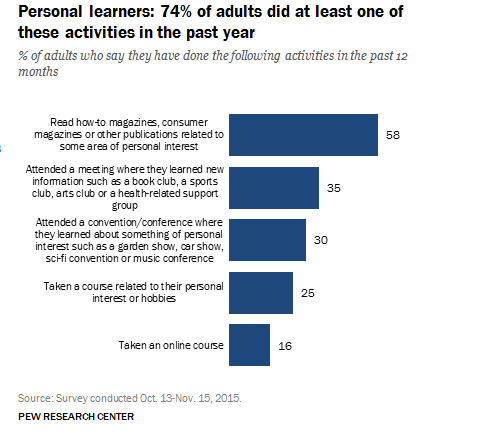
One of the strongest values of libraries of all types is that of lifelong learning. Pew Research Center’s new study of personal and professional attitudes about learning reveals some significant trends about how American adults pursue their interests. Nearly three-fourths (73%) of U.S. adults consider themselves lifelong learners in some sense, with 74% identifying as “personal learners” and 63% of working adults identifying as “professional learners.”
Somewhat surprisingly, physical locations are still more important to Americans than digital technologies for seeking knowledge. At 81%, personal learners are 29% more likely to say that they learn at a physical location more than online. Professional learners prefer physical environments by a similar margin as well.
The U.S. adults surveyed by Pew cited many important impacts that lifelong learning has had. The biggest impact experienced by personal learners was helping them to feel more capable and well rounded, with almost a whopping 9 out of 10 (87%) indicating this impact. For professional learners, two-thirds (65%) said that professional learning expanded their professional network.
What is perhaps one of the most important findings of the study is that whether or not one identifies as a lifelong learner is greatly influenced by education, income, and access to digital technologies. For example, an overwhelming majority (87%) of those with at least one college degree participated in personal learning activities in the past 12 months, whereas only 60% of those with a high school degree or less did the same. Pew found similar results based on income as well as having smartphones and home broadband connection. With this in mind, libraries are essential points of contact in the quest to bridge the digital divide and provide access to diverse learning opportunities for all members of a community.
Note: This post is part of our series, “The Weekly Number.” In this series, we highlight statistics that help tell the story of the 21st-century library.